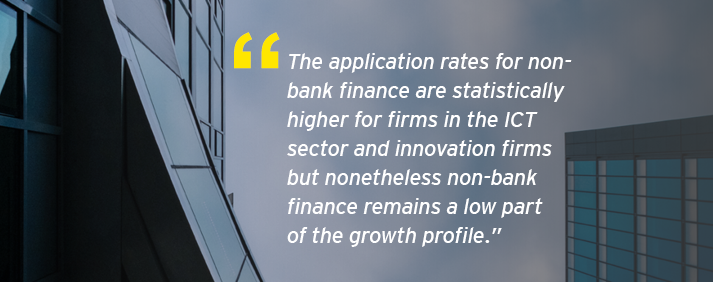Despite proliferation of non-bank financing options Irish SMEs are slow to tap new providers
The SME market plays a significant part in economic growth and employment in Ireland. According to the EY SME Market Monitor 2018 report prepared for Banking & Payments Federation of Ireland, SMEs (employing less than 250 persons) account for the overwhelming majority of enterprises, 69% of persons engaged, 56% of turnover and 50% of Gross Valued Added (GVA) in Ireland, their performance is very closely linked with the overall health of the economy. However as a sector it is particularly sensitive to market forces and can have limited access to short and long term financing as a consequence. These constraints stifle growth and the cycle continues. But is the multitude of emerging alternatives to providing capital and finance to SMEs going to drive this sector in new ways?
There is now an abundance of alternative non-bank financing sources from Peer-to-Peer Business Loans, Angel Investors, Crowdfunding and invoice trading solutions. One of these is the Dublin-headquartered Peer-to-Peer lender Flender – whose backers include former Ireland rugby international Jamie Heaslip – which has raised €10 million to lend to SMEs. This is part of €50 million targeted by the firm, which opened up for business last year and plans to raise money for property and asset-backed lending. They originally secured more than £500,000 to fund themselves through a UK crowdfunding platform which showcases non-bank finance potential.
One of the co-founders of Flender, Jeremy Davies, says that he expects the Peer-to-Peer lending market in Ireland to grow, and states “the annual volumes in the UK Peer-to-Peer lending market are over £7billion. By applying a crude rule of thumb of 10:1 scale between the UK and Ireland, the Irish market could grow to at least £700m but the current Irish run rate is approximately £70m.” He expects the growth to be achieved by taking away business from the banks rather than other non-bank competitors with speed of loan execution and customer experience the key differentiators.

The ecosystem is being driven by other forces – the European Commission’s growth strategy is focusing on enabling SMEs to access finance from suitable alternatives beyond banks. Providing an ecosystem for non-bank finance platforms to develop is critical to enable growth but they must do so within the regulatory structures set out for financial intermediaries. This has the effect of slowing the pace at which the ecosystem can be created. Strategic Banking Corporation of Ireland (SCBI) was set up in response to the European Commission directive and is part funded by European Investment Bank. SCBI offers lower cost, long-term, innovative and accessible funding to independent Irish SMEs by offering flexible products with longer maturity through a combination of banking and non-banking lending partners. It is currently working with non-bank financial institutions (such as leasing and invoice discounting providers) to expand the range of products available to SMEs.
These initiatives are providing more choice to SMEs, but the uptake in alternative lending in Ireland appears limited to date with some analysis showing it has decreased – probably due to Irish banks ability to lend to SMEs improving. According to the EY SME Market Monitor 2018 report new lending recorded annual growth of 16.5% in Q4 2017, which was equivalent to €1.55 billion, the highest level registered since records began in 2010 – yet according to the Fitzpatrick Associates report on behalf of the Department of Finance (SME Credit Demand Survey 2017), 23% of SMEs had applied for bank finance versus 7% applying for non-bank finance in the same period. The application rates for non-bank finance are statistically higher for firms in the ICT sector and innovation firms but nonetheless non-bank finance remains a low part of the growth profile.
So while the alternative SME non-bank finance ecosystem continues to evolve in Ireland, radical growth is not expected in the near future as Irish banks’ ability and willingness to lend to SMEs improves after the banking crisis. Potentially the biggest disruptor to the Irish SME Finance market has yet to arrive on these shores, GAFA bank (Google, Amazon, Facebook and Apple) – perhaps a discussion for another day!
This article first appeared in the September 2018 print edition of Finance Dublin.